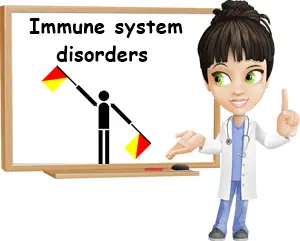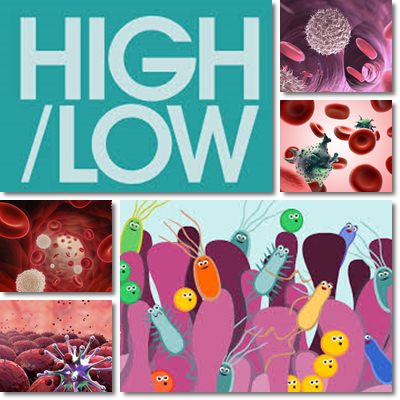Immune system deficiencies and disorders occur when the immune system is not working as it should and is either underactive or overactive. Having an underactive immune system means that, for some reason, the immune system is too weak to fight various pathogens or toxins, resulting in disease. Having an overactive immune system means that the immune system is so strong it may attack otherwise harmless substances we may come into contact with. Pollen allergies are a perfect example of an overactive immune system.
Autoimmune diseases are another type of overactive, but also confused immune system. In autoimmune diseases, the immune system fails to make a clear distinction between what is normally part of the body and what is not. As a result, it ends up producing antibodies against our own body and attacking perfectly healthy cells simply because it does not recognize them as being part of the body. Whatever form they may take, immune system disorders impact our overall health and wellbeing and need to be dealt with appropriately to reduce potential health risks in the future.

What are immune system disorders? Immune system disorders are disorders caused by abnormalities in the immune response. Normally, our immune system is aware of what is normally part of our body and what healthy cells should look like and protects us from any harmful foreign microorganism or substances. Find out more about the immune system. An abnormal immune system response occurs when the immune system is either underactive (too weak), overactive (too strong) or does not recognize various elements of its own kin (certain cells, nerves, hormones). Any such abnormality predisposes us to poor health and disease.
Underactive immune system
An underactive immune system is a weak, deficient immune system that cannot efficiently protect the body against infection and disease. Depending on the causes, an immune system deficiency may be primary or secondary, whether innate or acquired.
1) Primary immunodeficiency (or primary immune system deficiency). In primary immunodeficiency you are born with a weak immune system. It can be either hereditary (genetic) or non-hereditary (caused by problems during development in the uterus). Primary immunodeficiency is usually genetically inherited. Examples of primary immunodeficiency include rare disorders such as albinism (lack of skin pigmentation), tree man illness (infection with HPV causing severe skin growths), severe combined immunodeficiency (bubble boy disease) or periodic fever syndrome.

Primary immunodeficiency disorders are caused by various mutations of elements of the immune system such as: mutations of T and B cells, low count of T and B cells, absence of B cells, antibody abnormalities, phagocyte dysfunction or low number of phagocytes (cells that eat bacteria and viruses) etc. Most disorders start manifesting early in life, some as soon as the first year of life. Recurrent ear, skin or respiratory tract infections are considered signs of immunodeficiency.
Primary immunodeficiency disorders often cause developmental problems such as dwarfism, predisposition to cancer, skin-related symptoms such as hypopigmentation, eczema, skin lesions, joint pain, recurrent fever attacks, recurrent skin infections (particularly with Candida or HPV, Human papilomaviruses), but also a predisposition toward respiratory tract and ear infections such as sinusitis, bronchitis, pneumonia, otitis or ear infections.
2) Secondary immunodeficiency. While primary immunodeficiency is a result of being born with a weak immune system, secondary immunodeficiency is caused by a disease that weakens the immune system. In other words, the weak immune system is acquired during one’s lifetime. Examples of secondary immunodeficiency disorders include diseases such as AIDS and leukemia.
Secondary immunodeficiency disorders can be caused by:
1) Viral infections (HIV, human immunodeficiency virus, hepatitis viruses).
2) Chemotherapy and radiation (they weaken the immune system severely).
3) Poor nutrition and malnutrition (vitamins, minerals, proteins and other nutrients are vital for a strong immune system).
4) Extensive injuries (especially skin injuries) that predispose to infections of varying nature.
Reducing the risk for secondary immunodeficiency disorders can be done by managing certain risk factors:
1) Avoiding high risk situations that may favor contracting certain infectious diseases such as AIDS or hepatitis.
2) Avoiding toxins, heavily polluted areas, contaminated water and food etc.
3) Keeping to workplace safety guidelines to prevent extensive injury that may favor future bacterial infections.
4) Keeping to rigorous hygiene.
5) Getting sufficient rest. Sleep is vital for a strong immune system.
6) Eating sufficient protein because proteins support the immune function.
7) Getting our vitamins and dietary minerals.
Vitamins A, C and D, zinc, manganese, copper and iron are some of the nutrients we need on a daily basis for a healthy immune system.
Overactive immune system
An overactive immune system is one that targets harmless elements and approaches them fairly aggressively. Normally, when our immune system deals with bacteria, viruses or parasites, it generates inflammation at the site of the infection and draws resources from the body to support its actions. An overactive immune system puts a greater strain on the body and generates more inflammation when pursuing and trying to destroy harmless elements in addition to real pathogens, making it just as difficult to manage as immunodeficiency.
Some of the most common examples of an overactive immune system attacking harmless elements include the following disorders:
1) Seasonal allergies (pollen allergies).
2) Allergic rhinitis (hay fever).
3) Dust, mold, pet fur, cigarette smoke or other allergies.
4) Food allergies.
5) Asthma (a more serious response to allergens).
6) Anaphylactic shock.
7) Atopic dermatitis.
Autoimmune disorders
What is an autoimmune disease? An autoimmune disease occurs when an overactive immune system fails to recognize what is normally part of the body and attacks perfectly healthy cells by creating antibodies against them simply because it considers them foreign elements for some reason. Autoimmune disorders are diverse, meaning different types of tissue are targeted in different people. The cause for autoimmune disorders is still unknown.
Type 1 diabetes (mellitus) is a well-known autoimmune disease in which the immune system targets and destroys cells in the pancreas that produce insulin. Ultimately, the damage to the pancreas is so great that it doesn’t produce insulin and sufferers have to rely on insulin injections to be able to process the sugars in food. Lupus is another well-known autoimmune disease in which the immune system creates antibodies that attack various tissues in the body, particularly the joints, lungs, kidneys etc.
Rheumatoid arthritis causes the immune system to attack the joints, resulting in severe inflammation, pain and damage. In multiple sclerosis, the immune system attacks nerve cells, slowly breaking off communication between the central nervous system and the rest of the body. It results in muscle weakness and progressive loss of muscle control, which ultimately affects speaking, swallowing and breathing (see Multiple Sclerosis: Symptoms and Treatment).
Autoimmune diseases can affect different aspects of our health, from muscle control, blood vessels and digestive functions to thyroid and pancreas hormone production. Overall, autoimmune disorders are a serious health concern because of their impact on various systems’ health. It is imperative they be kept under the supervision of a medical professional and treated accordingly to minimize their adverse effects. Doctors will often prescribe various medications meant to help control immune system activity (example: prednisone). What these medicines do is partially suppress the activity of the immune system to counteract its overzeal.
Some overactive immune system disorders can be better managed with adequate nutrition, vitamin and mineral supplementation and lifestyle changes. For example, I have found that for pollen allergies it is important to limit contact with the allergen. If this is not possible, limiting exposure time, changing clothes and washing hair, face or any part of the skin that has come into contact with the allergen can help prevent an attack. In my experience, taking vitamin C daily also helps improve symptoms because vitamin C is a great natural anti-inflammatory and antihistamine agent.
